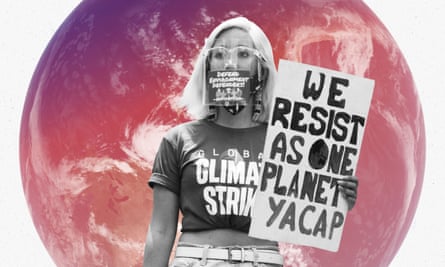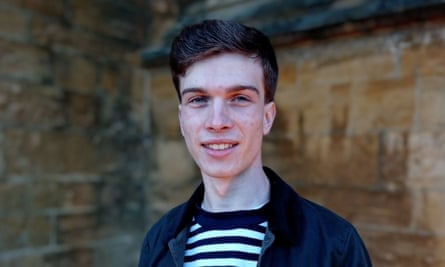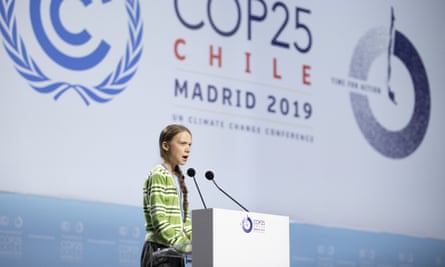Extract from The Guardian
Frustrated by postponement of UN talks, young people have organised their own virtual conference

Last modified on Wed 11 Nov 2020 04.40 AEDT
Like many young climate activists around the world, 14-year-old Lavinia Iovino was exasperated when Cop26, the annual UN climate summit due to take place in Glasgow in November, was postponed for a year because of the coronavirus pandemic.
“I was very disappointed because it showed that political leaders think we can give ourselves a year more, when we just can’t do that; the climate crisis is happening right now,” she said.
That’s why she was so excited by the prospect of Mock Cop26, a two-week virtual conference in November, organised by young people to fill the void. “We know there is a pandemic but if we, a group of people under the age of 30, realised we can do it perfectly online without any problems, so could they. If they wanted to, they would have arranged something,” said Iovino, who is one of 350 delegates from 141 countries attending the event. “We cannot just keep giving ourselves time that we don’t have.”
The alternative conference will feature speeches and panel discussions on topics such as climate education and climate justice, and it will culminate in delegates voting on a final statement to world leaders, which they hope will raise ambitions for Cop26 when it does go ahead in 2021.
The environmental law charity ClientEarth will help develop this statement into a legal treaty that national governments could adopt into law.
“It’ll be ambitious, but it will also be realistic,” said 18-year-old Josh Tregale from the UK, who is one of the event’s organisers. “We want to illustrate that young people have opinions, but they also know how to implement things and they can be leaders.”

The conference has been designed to be more inclusive than a typical Cop meeting and to have a greater focus on the countries most affected by the climate emergency. More time will be allocated to countries from the global south, and these countries will be allowed five delegates each, as opposed to three per country in the global north, giving them a greater say in the voting.
Delegates will be grouped into timezone bands, with a programme designed to fit around school. The event was pushed back to later in November to avoid clashing with Diwali. Tregale said: “We effectively looked at all of the things that Cop does and thought: how could we make it a bit better?”
This year’s postponed UN Cop was lambasted for its planned all-male team of hosts, adding to growing disillusionment with the process after last year’s talks ended with limited progress on emissions targets.
“Cop25 was advertised as the greatest Cop of all time, but nothing concrete, nothing real came from it. Nothing that could really be implemented,” said Iovino.
Sofía Hernández Salazar, 22, from Costa Rica, is a Mock Cop26 delegate and attended Cop25 last year. “There was a lot of ambition, but a lack of action at the end of the day,” she said. “They just negotiated about the economy with a focus on the global north, and didn’t talk about how the global south needs to adapt.”
She said she was impressed with the efforts of Mock Cop26 to involve indigenous people and ensure a diversity of voices, when the youth climate movement is so often dominated by white people. More than 800 young people applied to attend the conference, with the highest number of applicants from India, Kenya, Nigeria, Pakistan and the Philippines.
Mitzi Jonelle Tan, a volunteer from Manila in the Philippines, also found the approach of Mock Cop26 refreshing. “They’re making sure that the voices of the most affected areas are amplified, and making sure that we have a space and we’re not just tokenised,” said the 22-year-old. “Being able to connect with 141 countries and build real relationships and connections – that’s what I’ll take away from it.”
The organising team is made up of 18 student staff and 196 volunteer students from 52 countries, supported by the educational charity Students Organising for Sustainability. They are hopeful the event will build on the success of the school strike marches spearheaded by Greta Thunberg that swept the globe in 2019.

“The most important thing for us is to get attention from world leaders, but not just praise, we want them to commit to doing more,” said another organiser, Malaika Collette, 17, from Ontario in Canada. “They always say ‘oh you’re so inspiring’, but we don’t want that, we want real action. I think they almost treat us like we’re little kids.”
After Cop25 was relocated to Madrid at the last minute due to unrest in the host country Chile, and this year’s UK-hosted event was scuppered by coronavirus, the organisers hope their event will pave the way for more digitally focused and eco-friendly events in the future.
“To do a climate conference where you’re talking about how important it is not to release greenhouse gases, and then do that, it just seems silly and reckless,” said Tregale. “So hopefully we’ve illustrated that you don’t have to do it all in person.”
Those involved are under no illusions about the challenge facing them in getting world leaders to pay attention. “I don’t think it will have that much impact at first, maybe, but it will show that young people can scream in the streets but actually, if we want to, we can also be as professional as the big people who are saying we can’t do that,” said Iovino.
Regardless of the outcome, Tregale said, young people are crying out for an outlet to discuss the climate crisis. “The idea itself seems to really resonate with people – the fact we’re taking control and saying: ‘You’ve not given us a seat at the table so we’re going to make our own table, and we’re going to do it ourselves.’”

No comments:
Post a Comment